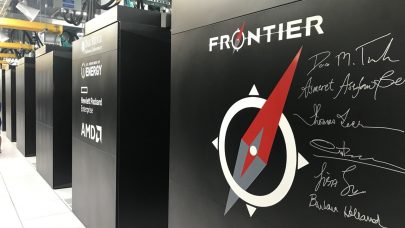
SCREAM Wins Gordon Bell Climate Prize at SC23
November 21, 2023
The first Gordon Bell Prize for Climate Modeling was presented at SC23 in Denver. The award went to a team led by Sandia National Laboratories that had develope Read more…

Top500: Aurora Is in the House, But It Is Still Frontier’s Party
November 13, 2023
The fall 2023 TOP500 list is out and Frontier retains its top spot and is still the only exascale machine. However, five new or upgraded systems have shaken up Read more…

EU Grabs Arm for First Exaflops Supercomputer, x86 Misses Out
October 4, 2023
The configuration of Europe's first exascale supercomputer, Jupiter, has been finalized, and it is a win for Nvidia and a disappointment for x86 chip vendors In Read more…

Appetizing Quantum Bits: Five Papers Looking at Noise, GANs, VQAs, Qubit Testing
July 12, 2023
What’s good way to characterize dynamic noise in QPUs? Why should CMOS and single electron spin qubits be a preferred approach? Can variational quantum algori Read more…

Lori Diachin to Lead the Exascale Computing Project as It Nears Final Milestones
May 31, 2023
The end goal is in sight for the multi-institutional Exascale Computing Project (ECP), which launched in 2016 with a mandate from the Department of Energy (DOE) Read more…

Exascale Frontier Supercomputer Has Passed Formal Acceptance: What That Means
May 22, 2023
Fresh off their third Top500 win for Frontier – now with an 8.4% higher Linpack score – the HPC team at Oak Ridge National Laboratory had some exciting news to share today. Frontier has passed its acceptance and is taking on grand scientific challenges. “Acceptance of Frontier took place at the... Read more…

Q&A with ORNL’s Travis Humble, an HPCwire Person to Watch in 2023
May 12, 2023
Travis Humble is the director the Quantum Science Center (QSC) at Oak Ridge National Laboratory. QSC is one of six National QIS Research established by the U.S. National Quantum Initiative Act (NQIA) in 2018 and being overseen by the Department of Energy. Hopes are high that these centers, through their own research and in collaboration... Read more…

Exascale Frontier Supercomputer Hosts Trio of New Cosmological Codes
April 27, 2023
Oak Ridge National Laboratory's exascale Frontier supercomputer – the first public exascale system in the world – debuted almost a year ago. Now, more and m Read more…

- Click Here for More Headlines

Whitepaper
Transforming Industrial and Automotive Manufacturing
In this era, expansion in digital infrastructure capacity is inevitable. Parallel to this, climate change consciousness is also rising, making sustainability a mandatory part of the organization’s functioning. As computing workloads such as AI and HPC continue to surge, so does the energy consumption, posing environmental woes. IT departments within organizations have a crucial role in combating this challenge. They can significantly drive sustainable practices by influencing newer technologies and process adoption that aid in mitigating the effects of climate change.
While buying more sustainable IT solutions is an option, partnering with IT solutions providers, such and Lenovo and Intel, who are committed to sustainability and aiding customers in executing sustainability strategies is likely to be more impactful.
Learn how Lenovo and Intel, through their partnership, are strongly positioned to address this need with their innovations driving energy efficiency and environmental stewardship.
Download Now
Sponsored by Lenovo
Whitepaper
How Direct Liquid Cooling Improves Data Center Energy Efficiency
Data centers are experiencing increasing power consumption, space constraints and cooling demands due to the unprecedented computing power required by today’s chips and servers. HVAC cooling systems consume approximately 40% of a data center’s electricity. These systems traditionally use air conditioning, air handling and fans to cool the data center facility and IT equipment, ultimately resulting in high energy consumption and high carbon emissions. Data centers are moving to direct liquid cooled (DLC) systems to improve cooling efficiency thus lowering their PUE, operating expenses (OPEX) and carbon footprint.
This paper describes how CoolIT Systems (CoolIT) meets the need for improved energy efficiency in data centers and includes case studies that show how CoolIT’s DLC solutions improve energy efficiency, increase rack density, lower OPEX, and enable sustainability programs. CoolIT is the global market and innovation leader in scalable DLC solutions for the world’s most demanding computing environments. CoolIT’s end-to-end solutions meet the rising demand in cooling and the rising demand for energy efficiency.
Download Now
Sponsored by CoolIT
Advanced Scale Career Development & Workforce Enhancement Center
Featured Advanced Scale Jobs:
HPCwire Resource Library
HPCwire Product Showcase
© 2024 HPCwire. All Rights Reserved. A Tabor Communications Publication
HPCwire is a registered trademark of Tabor Communications, Inc. Use of this site is governed by our Terms of Use and Privacy Policy.
Reproduction in whole or in part in any form or medium without express written permission of Tabor Communications, Inc. is prohibited.
























